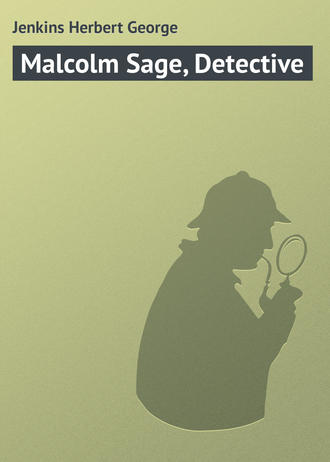 полная версия
полная версияMalcolm Sage, Detective
He paused for a moment; but the inspector made no comment.
"The two greatest factors in the suppression of crime," continuedMalcolm Sage, "are photography and finger-prints. Both are in use atScotland Yard; but each in place of the other. Finger-prints areregarded as clues, and photography is a means of identification, whereas finger-prints are of little use except to identify pastoffenders, and photography is the greatest aid to the actual tracingof the criminal."
Malcolm Sage never failed to emphasise the importance of photographyin the detection of crime. He probably used it more than all otherinvestigators put together. He contended that a photographic printestablished for all time what the eye could only dimly register forthe moment, with the consequent danger of forgetfulness.
As the links in a chain multiplied, it was frequently necessary torefer to the scene of a crime, or tragedy, and then probably someimportant point would crop up, which the eye had not considered ofsufficient importance to dwell upon. By then, in the case of amurder, the body would have been removed, and everything about iteither re-ordered or obliterated.
Malcolm Sage proceeded to stuff his pipe with tobacco which he drewfrom the left-hand pocket of his jacket. He had discovered that arubber-lined pocket was the best and safest pouch.
He picked up a third photograph and laid it beside the others. Itwas a print of Mr. Challoner's head, showing, marked in ink, thecourse of the bullet towards the left of the frontal bone.
"A man shooting himself," began Malcolm Sage, "places the pistol ina position so that the muzzle is directed towards the back of thehead. On the other hand, anyone approaching his victim from behindwould have a tendency to direct the muzzle towards the front of thehead. That is why I got Dawkins to take a photograph of me holdingthe pistol to my head and of you holding it from behind. Thesephotographs will constitute the principal evidence at the trial."
Sir James nodded. He was too interested to interrupt.
"On this enlargement of the wound," continued Malcolm Sage, "youwill see an abrasion on the side nearer the ear, as if the head hadsuddenly been jerked backwards between the time of the muzzle beingplaced against the temple and the actual firing of the shot."
Thompson leaned across to examine the photograph.
"If the eyes of someone sitting at a table are suddenly andunexpectedly covered from behind, the natural instinct is to jerkbackwards so that the head may be turned to see who it is. That isexactly what occurred with Challoner. He jerked backwards, and thebarrel of the pistol grazed the skin and was deflected still moretowards the frontal bone."
Sir James and Thompson exchanged glances. Dawkins stood by, a lookof happiness in his eyes. His beloved camera was justifying itselfonce more. Inspector Wensdale breathed heavily.
"Apart from all this, the position of the head on the table, and theway in which the hand was holding the pistol, not to speak of thecurve of the arm, were unnatural. You get some idea of this from thephotograph that Dawkins took of me, although I could only simulatedeath by relaxing the muscles. Again, the head would hardly belikely to twist on to its side."
"The doctor ought to have seen that," said the inspector.
Another thing against the theory of suicide was that the secondjoint of the first finger was pressing against the trigger. Mr.Challoner was an expert shot, and would instinctively have used thepad of the finger, not the second joint.
"The next step," continued Malcolm Sage, "was how could anyone getinto the room and approach Challoner without being heard or'sensed.'"
"He must have been very much absorbed in what he was doing,"suggested Sir James.
Malcolm Sage shook his head, and for a few seconds gazed at thephotographs before him.
"You will remember there was nothing on the table in front of him. Ishall come to that presently. It is very unlikely that a man sittingat a table would not be conscious of someone approaching him frombehind, no matter how quietly he stepped, unless that man'spresence in the room were quite a normal and natural thing. Thatgave me the clue to Peters. He is the only person who could be inthe library without Challoner taking any notice of him. Consequentlyit was easy for him to approach his master and shoot him."
"But the locked door, sir," said Thompson.
"That is a very simple matter. An ordinary lead-pencil, with a pieceof string tied to one end, put through the ring of the key to act asa lever, the cord being passed beneath the door, will lock any doorin existence. The pencil can then be drawn under the door. This willshow how it's done." Malcolm Sage reached across for a sheet ofpaper, and drew a rough sketch.
[Illustration]
"That is why you examined the under-edge of the door?" suggested Sir
James.
Malcolm Sage nodded. "The marks of the cord were clearly defined andreflected in the mirror. Had the key not been touched, it would havehelped."
"How?" asked Inspector Wensdale.
"By means of the string the key is turned only just to the pointwhere the lever falls through the hole to the floor. The fingerswould turn beyond that point, not being so delicate."
"Mr. Sage, you're a wonder," burst out the inspector.
"I then," proceeded Malcolm Sage, "examined all the other doors inthe house, and I found that of one room, which I after discovered tobe Peters', was heavily scored at the bottom. He had evidentlypractised fairly extensively before putting the plan into operation.He had also done the same thing with the library door, as there weremarks of more than one operation. Furthermore, he was wiser than totake the risk of so clumsy a tool as a lead-pencil. He used this."
Malcolm Sage drew from his pocket the roll of twine with the thinsteel instrument down the centre. It was a canvas-needle, to the eyeof which the cord was attached.
"This was absolutely safe," he remarked. "Another thing I discoveredwas that one lock, and only one lock in the house, had recently beenoiled – that of the library-door."
Sir James nodded his head several times. There was something ofself-reproach in the motion.
"Now," continued Malcolm Sage, "we come back to why a man should besitting at a table absorbed in gazing at nothing, and at a time whenmost of the household are either in bed or preparing for bed."
"Peters said that he was checking his pass-book," suggested Sir
James.
"That is undoubtedly what he was doing," continued Malcolm Sage,"and Peters removed the passbook, put it in a drawer, firstdestroying the cancelled cheques. He made a blunder in not replacingthe pass-book with something else. That was the last link in thechain," he added.
"I don't quite see – " began Sir James.
"Perhaps you did not read of a case that was reported from New Yorksome eighteen months ago. It was very similar to that of Mr.Challoner. A man was found shot through the head, the door beinglocked on the inside, and a verdict of suicide was returned; butthere was absolutely no reason why he should have taken his life.
"What actually happened was that Mr. Challoner went to his bank todraw five hundred pounds with which he hoped to bribe his nephew'sfiancée. He trusted to the temptation of the actual money ratherthan a cheque. When he was at the bank the manager once more askedhim to return his pass-book, which had not been balanced for severalmonths. He was very dilatory in such matters."
"That is true," said Dane, speaking for the first time.
"That evening he proceeded to compare it with his cheque-book. Isuspect that Peters had been forging cheques and he saw here whatwould lead to discovery. Furthermore, there was a considerable sumof money in the safe, and the quarrel between uncle and nephewto divert suspicion. This, however, was mere conjecture – thattrouser-pocket photo, Dawkins," said Malcolm Sage, turning to thephotographer, who handed it across to him.
"Now notice the position of those keys. They are put in headforemost, and do not reach the bottom of the pocket. They hadobviously been taken away and replaced in the pocket as Challonersat there. Had he gone to the safe himself and walked back to hischair, the position of the keys would have been quite different."
Instinctively each man felt in his trousers pocket, and found in hisown bunch of keys a verification of the statement.
"The whole scheme was too calculated and deliberate for an amateur,"said Malcolm Sage, knocking the ashes out of his pipe on to a brassashtray. "That is what prompted me to get the fingerprints of Peters,so that I might send them to Scotland Yard to see if anything wasknown of him there. The result you have seen."
"We've been on the look-out for him for more than a year," saidInspector Wensdale. "The New York police are rather interested inhim about a forgery stunt that took place there some time ago."
"I am confident that when Challoner's affairs are gone into therewill be certain cheques which it will be difficult to explain.
"Then, again, there was the electric light," proceeded Malcolm Sage."A man about to blow out his brains would certainly not walk acrossthe room, switch off the light, and then find his way back to thetable."
"That's true enough," said Inspector Wensdale.
"On the other hand, a murderer, who has to stand at a door for atleast some seconds, would not risk leaving on the light, which wouldattract the attention of anyone who might by chance be in the hall,or on the stairs."
Inspector Wensdale caught Thompson's left eye, which deliberatelyclosed and then re-opened. There was a world of meaning in themovement.
"Well, I'm glad I didn't get you down on a fool's errand, Sage,"said Sir James, rising. "I wonder what the local inspector willthink."
"He won't," remarked Malcolm Sage; "that is why he assumed it wassuicide."
"Did you suspect Peters was armed?" enquired Sir James.
"I saw the pistol under his left armpit," said Malcolm Sage. "It'swell known with American gunmen as a most convenient place for quickdrawing."
"If it hadn't been for you, Mr. Sage, he'd have got me," said
Inspector Wensdale.
"There'll be a heavy car-full for Tims," remarked Malcolm Sage, ashe walked towards the door.
CHAPTER IV THE SURREY CATTLE-MAIMING MYSTERY
I
"Disguise," Malcolm Sage had once re-marked, "is the chiefcharacteristic of the detective of fiction. In actual practise itis rarely possible. I am a case in point. No one but a builder,or an engineer, could disguise the shape of a head like mine;" ashe spoke he had stroked the top of his head, which rose above hisstrongly-marked brows like a down-covered cone.
He maintained that a disguise can always be identified, although notnecessarily penetrated. This in itself would be sufficient to defeatthe end of the disguised man by rendering him an object of suspicion.Few men can disguise their walk or bearing, no matter how cleverthey might be with false beards, grease-paint and wigs.
In this Malcolm Sage was a bitter disappointment to William Johnson, the office junior. His conception of the sleuth-hound had beentinctured by the vivid fiction with which he beguiled his spare time.
In the heart of William Johnson there were three great emotions: hishero-worship of Malcolm Sage, his romantic devotion to Gladys Norman, and his wholesome fear of the robustious humour of Tims.
In his more imaginative moments he would create a world in which hewas the recognised colleague of Malcolm Sage, the avowed admirer ofMiss Norman, and the austere employer of Tims – chauffeurs never tookliberties with the hair of their employers, no matter how knut-likeit might be worn.
It was with the object of making sure of the first turret of hiscastle in Spain, that William Johnson devoted himself to the earneststudy of what he conceived to be his future profession.
He read voraciously all the detective stories and police-reports hecame across. Every moment he could snatch from his official dutieshe devoted to some scrap of paper, booklet, or magazine. He stroveto cultivate his reasoning powers. Never did a prospective cliententer the Malcolm Sage Bureau without automatically setting intooperation William Johnson's mental induction-coil. With eyes thatwere covertly keen, he would examine the visitor as he sat waitingfor the two sharp buzzes on the private telephone which indicatedthat Malcolm Sage was at liberty.
It mattered little to William Johnson that error seemed to dog hisfootsteps; that he had "deduced" a famous pussyfoot admiral as acomedian addicted to drink; a lord, with a ten century lineage, as aman selling something or other; a Cabinet Minister as a companypromoter in the worst sense of the term; nothing could damp his zeal.
Malcolm Sage's "cases" he studied as intimately as he could from hisposition as junior; but they disappointed him. They seemed lackingin that element of drama he found so enthralling in the literaturehe read and the films he saw.
Malcolm Sage would enter the office as Malcolm Sage, and leave it as
Malcolm Sage, as obvious and as easily recognisable as St. Paul's
Cathedral. He seemed indifferent to the dramatic possibilities of disguise.
William Johnson longed for some decrepit and dirty old man or womanto enter the Bureau, selling boot-laces or bananas and, on beingperemptorily ordered out, to see the figure suddenly straightenitself, and hear his Chief's well-known voice remark, "So you don'trecognise me, Johnson – good." There was romance.
He yearned for a "property-room," where executive members of thestaff would disguise themselves beyond recognition. In his moreimaginative moments he saw come out from that mysterious room afull-blooded Kaffir, whereas he knew that only Thompson had entered.
He would have liked to see Miss Norman shed her pretty brunettenessand reappear as an old apple-woman, who besought him to buy of herwares. He even saw himself being transformed into a hooligan, or asmart R.A.F. officer, complete with a toothbrush moustache and"swish."
In his own mind he was convinced that, given the opportunity, hecould achieve greatness as a master of disguise, rivalling thehighly-coloured stories of Charles Peace. He had even put histheories to the test.
One evening as Miss Norman, who had been working late, was on herway to Charing Cross Underground Station, she was accosted by ayouth with upturned collar, wearing a shabby cap and a queer CharlieChaplain moustache that was not on straight. In a husky voice heenquired his way to the Strand.
"Good gracious, Johnnie!" she cried involuntarily. "What on earth'sthe matter?"
A moment later, as she regarded the vanishing form of William
Johnson, she wanted to kill herself for her lack of tact.
"Poor little Innocent!" she had murmured as she continued downVilliers Street, and there was in her eyes a reflection of the tearsshe had seen spring to those of William Johnson, whose first attemptat disguise had proved so tragic a failure.
Neither ever referred to the incident subsequently – although fordays William Johnson experienced all the unenviable sensations ofDamocles.
From that moment his devotion to Gladys Norman had become almostworship.
But William Johnson was not deterred, either by his own initialfailure or his chief's opinion. He resolutely stuck to his ownideas, and continued to expend his pocket-money upon tinted glasses, false-moustaches and grease paint; for hidden away in the innerrecesses of his mind was the conviction that it was not quiteplaying the game, as the game should be played, to solve a mysteryor bring a criminal to justice without having recourse to disguise.
It was to him as if Nelson had won the Battle of Trafalgar in a softhat and a burberry, or Wellington had met Blücher in flannels andsilk socks.
Somewhere in the future he saw himself the head of a "William
Johnson Bureau," and in the illustrated papers a portrait of "Mr.
William Johnson as he is," and beneath it a series of characters that would rival a Dickens novel, with another legend reading, "Mr.
William Johnson as he appears."
With these day-dreams, the junior at the Malcolm Sage Bureau wouldoccupy the time when not actually engaged either in the performanceof his by no means arduous duties, or in reading the highly-coloureddetective stories from which he drew his inspiration.
From behind the glass-panelled door would come the tick-tack of Miss
Norman's typewriter, whilst outside droned the great symphony of
London, growing into a crescendo as the door was opened, dying away again as it fell to once more, guided by an automatic self-closer.
From these reveries William Johnson would be aroused either byperemptory blasts upon the buzzer of the private-telephone, or bythe entry of a client.
One morning, as he was hesitating between assuming the disguise of anaval commander and a street-hawker, a florid little man with purplejowl and a white, bristling moustache hurtled through the swing-door, followed by a tall, spare man, whose clothing indicated his clericalcalling.
"Mr. Sage in?" demanded the little man fiercely.
"Mr. Sage is engaged, sir," said the junior, his eyes upon theclergyman, in whose appearance there was something that causedWilliam Johnson to like him on the spot.
"Take my card in to him," said the little, bristly man. "Tell himthat General Sir John Hackblock wishes to see him immediately." Thetone was suggestive of the parade-ground rather than a London office.
At that moment Gladys Norman appeared through the glass-panelleddoor. The clergyman immediately removed his hat, the general merelyturned as if changing front to receive a new foe.
"Mr. Sage will be engaged for about a quarter of an hour. I am hissecretary," she explained. She, also, looked at the general'scompanion, wondering what sort of teeth were behind that gentle, yetfirm mouth. "Perhaps you will take a seat," she added.
This time the clergyman smiled, and Gladys Norman knew that she tooliked him. Sir John looked about him aggressively, blew out hischeeks several times, then flopped into a chair. His companion alsoseated himself, and appeared to become lost in a fit of abstraction.
William Johnson returned to his table and became engrossed, ostensibly in the exploits of an indestructible trailer of men; butreally in a surreptitious examination of the two callers.
He had just succeeded in deducing from their manner that theywere father and son, and from the boots of the younger that hewas low church and a bad walker, when two sharp blasts on thetelephone-buzzer brought him to his feet and half-way across theoffice in what was practically one movement. With Malcolm Sage therewere two things to be avoided, delay in answering a summons, andunnecessary words.
"This way, sir," he said, and led them through the glass-panelleddoor to Malcolm Sage's private room.
With a short, jerky movement of his head Malcolm Sage motioned hisvisitors to be seated. In that one movement his steel-coloured eyeshad registered a mental photograph of the two men. That glanceembraced all the details; the dark hair of the younger, greying atthe temples, the dreamy grey eyes, the gentle curves of a mouth thatwas, nevertheless, capable of great sternness, and the spare, almostlean frame; then the self-important, overbearing manner of the olderman. "High Anglican, ascetic, out-of-doors," was Malcolm Sage'smental classification of the one, thus unconsciously reversing theWilliam Johnson's verdict. The other he dismissed as a pompous ass.
"You Mr. Sage?" Sir John regarded the bald conical head andgold-rimmed spectacles as if they had been unpolished buttons onparade.
Malcolm Sage inclined his head slightly, and proceeded to gaze downat his fingers spread out on the table before him. After the firstappraising glance he rarely looked at a client.
"I am Sir John Hackblock; this is my friend, the Rev. Geoffrey
Callice."
Again a slight inclination of the head indicated that Malcolm Sagehad heard.
Mr. Llewellyn John would have recognised in Sir John Hackblock thelast man in the world who should have been brought into contact withMalcolm Sage. The Prime Minister's own policy had been to keepMalcolm Sage from contact with other Ministers, and thus reduce thenumber of his embarrassing resignations.
"I want to consult you about a most damnable outrage," exploded thegeneral. "It's inconceivable that in this – "
"Will you kindly be as brief as possible?" said Malcolm Sage, fondling the lobe of his left ear. "I can spare only a few minutes."
Sir John gasped, glared across at him angrily; then, seeming to takehimself in hand, continued:
"You've heard of the Surrey cattle-maiming outrages?" he enquired.
Malcolm Sage nodded.
"Well, this morning a brood-mare of mine was found hacked about inan unspeakable manner. Oh, the damn scoundrels!" he burst out as hejumped from his chair and began pacing up and down the room.
"I think it will be better if Mr. Callice tells me the details,"said Malcolm Sage, evenly. "You seem a little over-wrought."
"Over-wrought!" cried Sir John. "Over-wrought! Dammit, so would yoube if you had lost over a dozen beasts." In the army he was known as"Dammit Hackblock."
Mr. Callice looked across to the general, who, nodding acquiescence, proceeded to blow his nose violently, as if to bid Malcolm Sagedefiance.
"This morning a favourite mare belonging to Sir John was foundmutilated in a terrible manner – " Mr. Callice paused; there wassomething in his voice that caused Malcolm Sage to look up. Thegentle look had gone from his face, his eyes flashed, and his mouthwas set in a stern, severe line.
"Good preacher," Malcolm Sage decided as he dropped his eyes oncemore, and upon his blotting pad proceeded to develop the PonsAsinorum into a church.
In a voice that vibrated with feeling and suggested greatself-restraint, Mr. Callice proceeded to tell the story of thelatest outrage. How when found that morning the mare was still alive,of the terrible nature of her injuries, and that the perpetrator haddisappeared, leaving no trace.
"Her look, sir! Dammit!" the general broke in. "Her eyes havehaunted me ever since. They – " His voice broke, and he proceededonce more to blow his nose violently.
Mr. Callice went on to explain that after having seen the mare putout of her misery, Sir John had motored over to his lodgings andinsisted that they should go together to Scotland Yard and demandthat something be done.
"Callice is Chairman of the Watchers' Committee," broke in Sir John.
"I should explain," proceeded Mr. Callice, "that some time ago weformed ourselves into a committee to patrol the neighbourhood atnight in the hope of tracing the criminal. On the way up Sir Johnremembered hearing of you in connection with Department Z and, as hewas not satisfied with his call at Scotland Yard, he decided to comeon here and place the matter in your hands."
"This is the twenty-ninth maiming?" Malcolm Sage remarked, as heproceeded to add a graveyard to the church.
"Yes, the first occurred some two years ago." Then, as if suddenlyrealising what Malcolm Sage's question implied, he added: "You haveinterested yourself in the affair?"
"Yes," was the reply. "Tell me what has been done."
"The police seem utterly at fault," continued Mr. Callice. "Locallywe have organised watch-parties. My boys and I have been out nightafter night; but without result. I am a scout-master," he explained.
"The poor beasts' sufferings are terrible," he continued after aslight pause. "It is a return to barbarism;" again there was thethrob of indignation in his voice.
"You have discovered nothing?"
"Nothing," was the response, uttered in a tone of deep despondency.
"We have even tried bloodhounds; but without result."
"And now I want you to take up the matter, and don't spare expense,"burst out Sir John, unable to contain himself longer.
"I will consider the proposal and let you know," said Malcolm Sage, evenly. "As it is, my time is fully occupied at present; butlater – " He never lost an opportunity of resenting aggression byemphasising the democratic tendency of the times. Mr. Llewellyn Johnhad called it "incipient Bolshevism."
"Later!" cried Sir John in consternation. "Why, dammit, sir! therewon't be an animal left in the county. This thing has been going onfor two years now, and those damn fools at Scotland Yard – "







